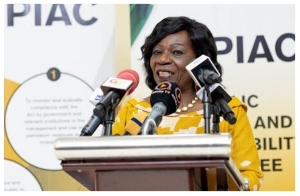 PIAC Chairperson, Emerita Professor Elizabeth Ardayfio-Schandorf
PIAC Chairperson, Emerita Professor Elizabeth Ardayfio-Schandorf
Most petroleum-funded revenue projects in the Districts/Municipal Assemblies in Ghana are initiated without consultation or the involvement of the assemblies and residents of the areas involved.
This was disclosed by the Chairman of the Public Interest and Accountability Committee (PIAC), Emerita Professor Elizabeth Ardayfio-Schandorf.
Speaking during a 2-day media engagement in Koforidua in the Eastern Region over the weekend, to present and discuss the 2023 PIAC Annual Report, the Chair of PIAC said, for instance, twelve (12) projects from the Annual Budget Funding Amount (ABFA) inspected in the year under review in the Bono, Upper West, Central, and Greater Accra regions are being done without the involvement of the Assemblies.
"So, our monitoring was to find out if the projects existed and if there were issues of accountability and transparency, and in all the places we have been to, we found out that the assemblies are sidestepped when it comes to these petroleum-funded projects," she said.
"We realized this is so bad for the assemblies and the residents who are to benefit from these projects in their various localities, as it does not promote citizen participation."
Emerita Professor indicated that this raised concerns of transparency and accountability because these projects are meant to benefit the citizens in these areas, and there should be the need to make them aware.
She said the inspection exercise was meant to monitor the progress of work, the effectiveness, and efficient use of petroleum-funded development projects, and how the citizens show interest in how petroleum revenue is being used.
Again, the report found that crude oil production declined for the fourth consecutive year in 2023. Production dropped from a high of 71.44 million barrels in 2019 to 48.25 million barrels in 2023, representing an annual average decline of 9.2% for the period under review.
Also, activities in the upstream petroleum industry of Ghana were slow during the period under review. This, according to the report, may be due to the slow nature of the resumption of activities after the restrictions by COVID-19.
The Committee, however, observed that there was no Petroleum Agreement signed in the year 2023.
The last Petroleum Agreement was signed in 2018, and it recommended to all stakeholders to ensure that investment is attracted to Ghana's petroleum sedimentary basins, as well as increase exploratory activities by International Oil Companies (IOCs) to increase the chances of making finds and increasing the producing fields and revenues.
Economies endowed with hydrocarbon resources have a responsibility to ensure the prudent management and utilization of such resources, as revenues from the extraction of these resources may constitute a significant portion of fiscal revenues.
Utilizing these resources in a way that ensures sustainable economic development, reduces poverty, and promotes social welfare underpins policy formulation on petroleum revenue management.
Ghana's Petroleum Revenue Management Act (PRMA), 2011, Act 815, Section 51 established the Public Interest and Accountability Committee (PIAC) to, among others, monitor and evaluate compliance in ensuring transparency and accountability in the use and management of petroleum revenues in Ghana.